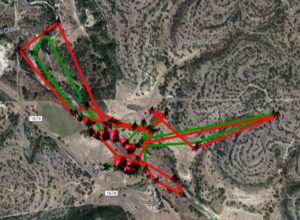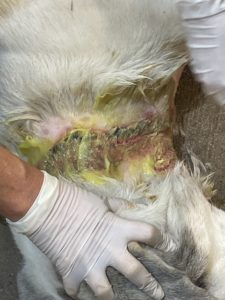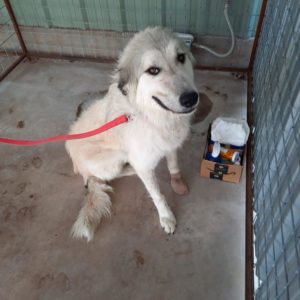Daily temperatures are starting to decline, and fall is coming soon. A chilly winter with normal rainfall is predicted for Texas this year. With fall approaching, now is the time to body condition score your LGDs to make sure they have enough fat cover to keep them in adequate condition through the winter. Dogs have a one to nine body condition scale, and the ideal score is a five. Your LGD should be at least a BCS of four going into the winter months so that it can be at a five or more in time for spring lambing and kidding.
AgriLife Livestock Guardian Dog Program: Events and Update
Don’t forget our next Facebook live LGD Q&A Session is this Thursday at 3pm. You can post your questions in the comments of the post from last week to be answered!
We are very excited to have a visit from Dr. Linda Van Bommel from the Fenner School of Environment and Society Australian National University on Oct. 14. Dr. Bommel has conducted research in Australia using LGDs and has written an excellent handbook to help producers effectively use the dogs. She will tour the Texas A&M AgriLife Research and Extension Center in San Angelo and the Sonora Station before leaving to visit the U.S. Sheep Experiment Station in Idaho and the University of Montana.
We will be holding our Fall LGD Field Day on Oct. 21 in Hamilton at the Jayson Harris Pavilion, 1007 Park Road. The event will run from 8 a.m.-4 p.m. and consist of several workshops, a producer panel, and a local ranch tour. Vendors and LGD breeders will be onsite for producers to visit with also. Registration is $25 single and $40 for a couple. Make sure to register by Oct. 14 to get the lower fee. If you would like to register for the event, please contact the Hamilton County AgriLife Extension Office at 254-386-3919.
LGDs & The Bonding Project Update
Round Four Pups
Overall, the pups are doing well at their new ranches. We have seen some of the dogs get hot spots from the tracking collars. Blue (aka Barney) got a severe hot spot on his neck. It’s important to check the dog’s necks regularly after a rain and then hot weather. That’s when we see the most cases of the sores happen. Its best to remove the collars, shave the area and apply a medicated ointment or spray daily until the skin heals in seven to ten days. All of the pups have healed up and are back out guarding livestock.
All the pups are starting to develop their guarding patterns at this point and generally working as a team. You can see from the GPS tracking picture of Carol and Cindy that even though they were raised separately

Carol and Cindy on a ranch in Junction. These pups are siblings but raised and bonded separately. (Texas A&M AgriLife photo courtesy Lone Star Tracking 2022)
both dogs are following each other across the pasture.
Adult Dogs
Miley is back at the Center with Ehrlichiosis and some arthritis in her left rear leg. She’s 10 years old now and the last one from her litter. She will be staying here to semi retire with Duchess. Miley will be in the kennel for a couple months recuperating from the Ehrlichiosis infection. She is difficult to catch in the field and has not been getting her tick medication. This disease is prevalent across Texas and its very important to have well socialized dogs that can be caught so that you can prevent this disease. It is transmitted by ticks and can spread through tick bites to other LGDs on your ranch. Once the dogs have the disease most still test positive even after recovering. The disease will reappear any time the dogs body system is stressed. It can decrease the dog’s life span which in turn increases your production costs to replace them earlier than necessary.
Thelma is still in the kennel also. She is gradually regaining weight from her case of Ehrlichiosis. We have her on a very high-quality kibble so that she can recuperate as quickly as possible. We are also giving her a daily probiotic powder to assist her digestive tract in breaking down the feed.
Doc was back in the kennel for a couple weeks last month. He got a severe cut on the bottom of his paw that required over twenty stitches and several days in the kennel to recover. He will be going back to the ranch in Menard as soon as the paw is completely healed.
In closing
If you enjoyed this monthly LGD blog, please don’t forget to subscribe to it with this link The Guardian Way | Texas A&M AgriLife Research and Extension Center at San Angelo.
To provide feedback on this article or request topics for future articles, please contact me at bill.costanzo@ag.tamu.edu or 325-657-7311.
The Texas A&M AgriLife Livestock Guardian Dog Program is a cooperative effort by Texas A&M AgriLife Research and the Texas Sheep and Goat Predator Management Board. Make sure to follow us on our social media sites and share them with your friends and family!
Facebook: https://www.facebook.com/TAMUlivestockguarddog/
Instagram: @tamulivestockguarddog
YouTube: https://www.youtube.com/channel/UCF7YbP6bNDV7___6H8mifBA
Don’t forget to check out the Texas LGD Association on online! Follow the organization at https://www.facebook.com/TexasLGDAssociation or check out their website!







